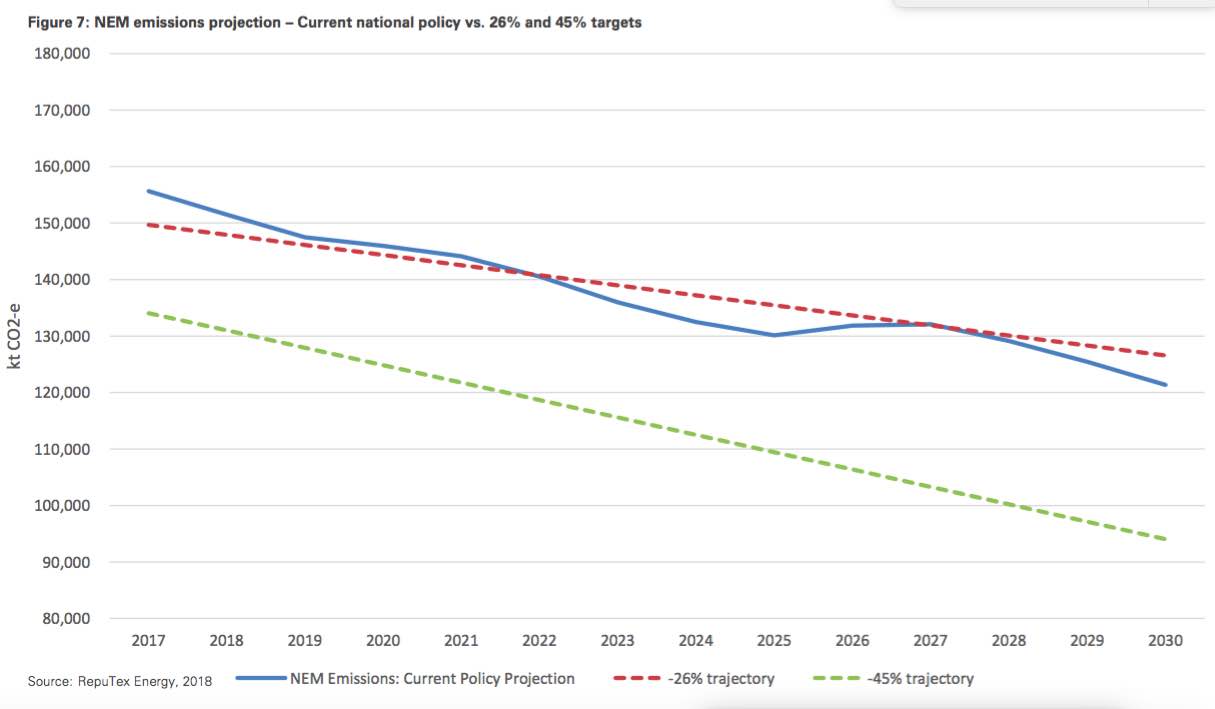New modelling by energy market analysts RepuTex has added to the deepening concern about the proposed National Energy Guarantee, suggesting it is calibrated to achieve an outcome that is worse than doing nothing.
The RepuTex analysis builds on concerns that the modelling used to underpin support for the NEG made a complete hash of estimating what would happen if no policy was in place.
It finds that the “do nothing” scenario still results in a 29 per cent cut in emissions by 2030 – more than the 19 per cent assumed by the Energy Security Board and more than the 26 per cent targeted under the NEG.
That means that the NEG would provide no incentive for any new investment in renewable energy.
Reputex says the analysis commissioned by ESB ignored two key schemes.
One was rooftop solar, and the SRES scheme that supports it. Rooftop solar is currently being installed at record rates of more than 1GW a year as households and businesses respond to soaring grid prices.
And it also appears to have ignored – apart from some initial auctions already in place – the legislated 40 per cent renewable energy target in Victoria by 2025, and the 50 per cent target in Queensland by 2030.
That amounts to a total of 8GW of capacity that has been effectively ignored by the ESB analysis.
It means that the ESB’s claims that the NEG would lift investment in renewables to 36 per cent of total production from 31 per cent under business as usual are wrong.
Reputex says business as usual would be 40 per cent.
Perhaps the only explanation for the Coalition’s omission of this capacity is their assumption that the state-based schemes will be repealed, as it and ESB chair Kerry Schott are calling for, and that the SRES will be dumped or scaled back.
In the same way, the renewables that the ESB forgot would contribute to emissions from Australia’s electricity sector falling around 29 per cent in the “do nothing” scenario – because of the state schemes and the uptake of rooftop solar.
The NEG is designed to achieved a reduction of 26 per cent. It claimed the do-nothing scenario would result in only a 19 per cent fall in emissions from the electricity sector.
“This raises questions over the design of the NEG, with a ‘do nothing’ scenario already projected to be more ambitious than the government’s emissions target, rendering the new policy immaterial to the market,” Reputex says in its report.
“As currently designed, the NEG is therefore likely to have negligible impact on the market, with current state policy the dominant driver of new renewables build.
“Unless the emissions target embedded within the NEG exceeds where emissions will be under a ‘do nothing’ scenario – i.e. at least a 30 per cent reduction below 2005 levels by 2030 – there is little need for the administrative complexity of the emissions guarantee, or any reliability mechanism.”
Indeed, it could and should be argued that if the NEG was to achieve anything at all, then the emissions target should be significantly higher. That was certainly the overwhelming view of nearly all the submissions made to the ESB – from Origin Energy all the way down to the smallest retailer.
The submissions filed over the last week point to myriad dangers of the policy:
- That is is hopelessly inadequate on emissions
- That it will eliminate competition and push up prices
- That it eoes not address reliability and may in fact delay investment in battery storage and pumped hydro (say Genex and Tesla).
- Will provide no incentive for any new investment for large scale wind and solar.
- Is unnecessarily complex.
Reputex is not the only company to say that the NEG delivers worse than business as usual. Gordon Weiss, from Energetics, a widely respected consultancy firm, argued the same case in the first of a three part series on Friday.
“Unless the target is more ambitious than where emissions are projected to be without the NEG, there is little need for the administrative complexity of the scheme”, Reputex says.
It says that if state-based scheme continue – contrary to the wishes of the Coalition government and the ESB chair – then an “arms race” between the states for renewable investment would take place. NSW, which has no state-based target, risks being left behind.










